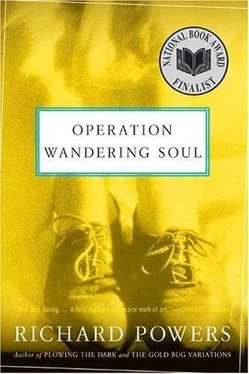Richard Powers - Operation Wandering Soul
Здесь есть возможность читать онлайн «Richard Powers - Operation Wandering Soul» весь текст электронной книги совершенно бесплатно (целиком полную версию без сокращений). В некоторых случаях можно слушать аудио, скачать через торрент в формате fb2 и присутствует краткое содержание. Год выпуска: 2002, Издательство: Harper Perennial, Жанр: Современная проза, на английском языке. Описание произведения, (предисловие) а так же отзывы посетителей доступны на портале библиотеки ЛибКат.
- Название:Operation Wandering Soul
- Автор:
- Издательство:Harper Perennial
- Жанр:
- Год:2002
- ISBN:нет данных
- Рейтинг книги:5 / 5. Голосов: 1
-
Избранное:Добавить в избранное
- Отзывы:
-
Ваша оценка:
- 100
- 1
- 2
- 3
- 4
- 5
Operation Wandering Soul: краткое содержание, описание и аннотация
Предлагаем к чтению аннотацию, описание, краткое содержание или предисловие (зависит от того, что написал сам автор книги «Operation Wandering Soul»). Если вы не нашли необходимую информацию о книге — напишите в комментариях, мы постараемся отыскать её.
Operation Wandering Soul — читать онлайн бесплатно полную книгу (весь текст) целиком
Ниже представлен текст книги, разбитый по страницам. Система сохранения места последней прочитанной страницы, позволяет с удобством читать онлайн бесплатно книгу «Operation Wandering Soul», без необходимости каждый раз заново искать на чём Вы остановились. Поставьте закладку, и сможете в любой момент перейти на страницу, на которой закончили чтение.
Интервал:
Закладка:
Ricky carved for three days. He discovered that his hands, alone of all his willful body, would do what he told them. He could think an arc almost too small to see, then duplicate it on the stone skin. When he put in place the last delineation between tiny vertebrae, the magic intaglio replica blood vessels, he knew he was finished, that he had done what he needed with the shattered waste.
He took the shard back to the abbot and handed it to him. The abbot stared at it through his thick black frames, his face clouding over.
"What is this?" the abbot softly demanded.
Ricky could say nothing. He could add no description to the thing that the thing didn't already contain.
The abbot squinted, running his nail over the startling internal detail. "Do you know what this is?" the abbot asked again.
Ricky did not dare tilt his neck.
"This is the voice box of the last child to leave the Wheel." He put his fingernail inside a striation. "The place where the final farewell shout will appear." He chuckled softly to himself, thanked the boy for the gift, and set it on the shelf the priceless statue had once occupied.
The day arrived when the boy would leave the monastery. And on that day he made his last rounds, taking leave of the monks — the abbot, the senior who had shaved his head, the new crop of novices. As he was given back his lay clothes, Ricky found himself, to his horror, wondering what he'd gotten out of the experience.
That he still asked meant he had gotten nothing. He would forever remain the offspring of his upbringing. Beating through his pallid skin was the sick bias of his home island: we must be headed somewhere. Somewhere unprecedented. He would never escape the need to unravel, extend, be off. The question itself, the desire to arrive, prohibited passage. He had gained nothing but the ability to chant in Pali, to survive mind-numbing tedium, and to hold his hand steady enough to carve.
He was stunned to learn that he had been in the monastery just under a month. The new school year was still weeks away. Four steps into the world, his whole head was thrown open. He stood on the front edge of outside, frozen like a cave creature blinded by the outside. Eyes, ears, throat, nose, and pores all dilated, backpedaling to accommodate the exchange threatening on all sides to swamp them.
Four weeks of deprivation had damped down his senses to exist on thinnest impulse. Now the city erupted around him in a Water Festival, a New Year's of obscene scale. From all sides, people shouted at him to hurry up, buy something from them, save their child, get out of their way. Each word was a firework exploding next to his ear. He was jostled by brushes, bumps, casual collisions, the mercenary seductive assaults of endless unfed cats arching against his ankles.
And smell: a wall of overpowering durian, jasmine, charcoal, animal feces, now vined over with pungent parasites. Quinine barks, mosquito repellent, sandalwood from a second-story window, frying banana oil, the inks of cheap romance magazines, starch from schoolgirls' uniforms, fear in its many street varieties, beetles exhuming the soil, smoke from minidragon industries, lotus leaves rotting in a canal, rice paper, powdered-over fever blisters of infants, cot sores on the old — heat, fever, ecstasy, survival, melting ice. The scent of ice melting.
Food everywhere, indecent in its variety. Fried shrimp crackers, saté, boiled fish, teas, peanuts sugared or sopped; sesames, rice-flour gels, meats whose awful origin Ricky only now calculated. He stopped a vendor and bought a slivered mango. Crouching by the curb, he held dollops of it to his tongue. Sweet venoms shot straight to his cerebral cortex and blasted across that synapse map like purest Golden Triangle opiate. He had never — he knew now; would never forget (although the sensation was already vanishing, unarrestable) — he had never tasted.
Across the spider's web of paved canals, unable to keep to a bearing, a bantam who'd taken too many kicks to the head, he mazed his way through a city that, in his month away, had changed beyond recognition. How could he have missed this all? Just over the river, in a back alley not far from the palace, he was jerked around so violently that he started to run. Something alive, complex, a pulsing, globular disorder tumbled over itself, like Rama's monkey army rampaging in the overgrown forest. He knew the thing from ancient history. Sound filled him, and would not all fit. The attack inflated his veins like a surgical balloon.
It came from no one source. The air itself generated a coordinated agreement of particles, a sonic sphere. At last recognizing it, Ricky yelled the word "Music!" into a crowd that went about sweeping stoops or hanging out carcasses. Someone somewhere had the radio on; that was all. But extended aural abstinence made it seem as if all the molecules of earth had converted themselves into one steel-gong philharmonic. He had learned the song a life or more ago:
Tell, me, little one: Have you ever seen an elephant?
He relearned the folk song in Free class the next semester, almost before his ears had readjusted to the outside. Hair growing back, he sat among chums grown prematurely sophisticated on the two-year circuit, the child elite of four dozen countries-offspring of UN relief agencies, intercontinental traders, lifer servicemen, or covert advisers; children who, like Kraft, claimed they didn't know what their parents did — all linked by the shame of their privileged sahib-ships, each child damp with the friction, misery, and exquisite alarm of awakening urges, each feverishly pursuing fluid formations of allegiance and taste, each of them struggling to get through this toddler's tune, banal in the extreme, singing in half-earnest for the last time before falling into jaded, self-conscious silence.
His face grew hot and his giveaway, traitor albino eyes began to flush themselves from their rims. Ricky sang along in quavering full voice, even while classmates around him openly laughed. His arms and emaciated upper chest shook as if naked in the arctic, but he laughed too, to realize it: he had gained nothing at all. Nothing that he hadn't always, from the start of time, already had.
He sang forte, to drown out that searing, tiny treble vocal cord of accompaniment, that appeal beyond bearing. But he could not outsing memory. At song's end, before they went on to plane geometry, he raised his hand and, in his most pristine Free, in that soft, insistent forensic of children (that planetwide Stone Age tribe still lumped together in one clan), he said what he had learned while gone.
He told how there were children their age, alongside town, just at hand, wasting away hideously, calling out to this international class— this us —to come away. Come save them.
Her rubbery resistance, sensuous in the stretch of its catenaries, spectacularly miniatured even by Oriental standards, is so uncannily perfect that it forgoes a navel, bears no hint of that dimple where the mold took its molten feed. What in creation is this thing? Smooth, slick, rippled, striated, zoomable to full complexity at every magnification. His textbook snip sneaks through the slippery veneer, revealing whole structures folded within structure. Up here, at organ level, it seems a stash-stuffed haversack, an elastic, single-sheet hyperbolic solid lashing with surface tension a vitreous humor that would otherwise spew jelly all over the cavity.
Press any part, push this subassembly with the blade, that doorstop wedge so narrowed that it becomes lethal. Interrogate the clayey marbling with that oldest simple machine on mankind's curriculum vitae. Separate and split, part the red corpuscular sea until the thing unsheathes, cleaves back into a Rothko cross section that did not exist discretely until this clean trough vectored it.
Читать дальшеИнтервал:
Закладка:
Похожие книги на «Operation Wandering Soul»
Представляем Вашему вниманию похожие книги на «Operation Wandering Soul» списком для выбора. Мы отобрали схожую по названию и смыслу литературу в надежде предоставить читателям больше вариантов отыскать новые, интересные, ещё непрочитанные произведения.
Обсуждение, отзывы о книге «Operation Wandering Soul» и просто собственные мнения читателей. Оставьте ваши комментарии, напишите, что Вы думаете о произведении, его смысле или главных героях. Укажите что конкретно понравилось, а что нет, и почему Вы так считаете.












